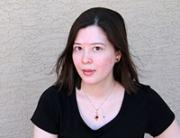Dilruba Ahmed’s debut book of poems, Dhaka Dust (Graywolf, 2011), won the Bread Loaf Writer’s Conference 2010 Bakeless Prize for poetry. Her writing has appeared in Blackbird, Cream City Review, New England Review, New Orleans Review, Drunken Boat, and Indivisible: Contemporary South Asian American Poetry. TriQuarterly Online spoke with Ahmed, a writer with roots in Pennsylvania, Ohio, and Bangladesh, about her background, process, and influences.
 TriQuartely Online: What were some of your first impactful encounters with poetry? When did you arrive at the writing life?
TriQuartely Online: What were some of your first impactful encounters with poetry? When did you arrive at the writing life?
Dilruba Ahmed: My desire to write was probably sparked by my upbringing in a literature-loving household on the one hand, and my experience of growing up as an outsider in midwestern towns on the other. My family moved fairly frequently, so not only was I a brown girl of Muslim heritage raised in a bilingual, hybrid environment, but also “the new kid” again and again in small towns: rural towns in the foothills of the Appalachians; declining towns with almost half the population under the poverty line; western Pennsylvanian towns where, just one generation back, many family members had been members of the KKK.
I think I was ten when I wrote my first poem. Later, after one particularly difficult move at the end of middle school, I began filling notebooks with (angst-ridden) poetry. It’s hard to say how I became a writer. I do know that I was deeply influenced by my mother, who has always been passionately interested in poetry and has translated Bangla poems aloud to me from time to time. My older sisters also played a role, as they were both interested in creative writing and brought home work by Dickinson, Whitman, Frost, Plath, and others. My dad is a poetry fan as well.
I owe a debt to my early college instructors, who gave me the courage to believe in myself as writer and to keep going. After college, I worked full-time for a decade before finally enrolling in an MFA program, and in the intervening years I wrote at first not at all, then just a little, and then with greater and greater frequency.
TQO: In “To Agha Shahid Ali,” you once wrote, “Whether one’s particular Asian American identity plays prominently in one’s work is less important than whether one’s work strives to move us toward nuggets of truth. Because the truths of human experience are messy, complicated things that involve a necessary blurring of boundaries and divisions, the very divisions that enable us to pit one human against another. And for many Asian Americans, our lives are, by their very nature, both complex and contradictory.”
Revisiting these thoughts in terms of Dhaka Dust, were there particular truths (conscious or not) that were especially important to you in this book?
DA: I can’t really make any claims about the truths in my own work, but I can say that I was interested in exploring some of the following: a familial and cultural history marked by rifts in time and place. The comforts and complexities of familial relationships. The notion of home—longing, love, loss. Collapsed geographies, cultures, and histories. I was interested in the blurring of boundaries: East-West, but also past-present-future, here-there, us-them, you-me.
TQO: Language emerges as one of the recurring threads in your work, in phrases such as “I’ll speak / three languages of longing,” “in a library of troublesome words,” “My mother tongue dissolves / I speak in another” and in the poem “Translating Tagore.” In what language(s) are you most at home? Has translation (reading or writing) influenced your work?
DA: English has been my dominant language in speaking, reading, and writing, but my mother’s oral translations of Bangla poetry (not from Bangla to English, exactly, but from formal Bangla into everyday Bangla that I could more clearly understand) have had a lasting impact on me. As I’ve learned from my mother’s efforts to translate (she provides the words I’ll understand but also tries to explain the resonances that don’t necessarily come across through mere definition), there are simply some terms and subtleties that cannot be rendered fully in another language. I find these gaps wonderfully mysterious.
In my “letter to readers” for Dhaka Dust, I describe the poems as representing a speaker whose experiences have been shaped by American culture while remaining deeply influenced by a ghost homeland and language. As suggested by the book’s epigraph, Agha Shahid Ali’s description of discovering an “exit to Calcutta” in Ohio, this left-behind life and language—ever-present and yet always just out of reach—infuses the present with a deep, unnamable sense of longing.
TQO: What aspects of writing poetry especially delight or challenge you?
DA: In an essay called “Childhood and Poetry,” Pablo Neruda describes how he believes that his desire to write poetry emerged from an early, memorable experience, one in which he and another child once silently and anonymously swapped toys though a fenceboard-hole. He tells us how this “small and mysterious exchange of gifts” awakened him to the notion that, beyond the vital intimacy we share with known beloveds, there exists the possibility of a broader communion with total strangers. That notion of poetry as a “small and mysterious exchange of gifts” delights me—the idea that an act beginning in isolation has the capacity to ultimately connect us through our sense of humanity, regardless of time or place, so that the work of Su Tung-P’o or Mirabai continues to speak in profound ways to, for example, contemporary American readers.
There’s also the rush that accompanies an unexpected line or phrase, and that time when the poem or fragment or rhythmic pattern lives only in the imagination and remains full of possibility.
As for the challenges, there are many, but finding time is probably the most difficult one right now, particularly because my husband and I have become parents. I’m lucky to have a supportive spouse and dedicated writer friends who continually inspire me.
TQO: Dhaka as a city, real yet filtered through memory, ancient yet bursting with change—could you elaborate more on what this place means to you?
DA: Dhaka is the capital city of a country that, while relatively new in name, is rich in history and tradition, with a population as passionate about politics as it is about poetry. On a public and political level, Dhaka represents parts of the world that—as world citizens and consumers in an increasingly globalized existence—we can no longer ignore. When we purchase clothing from most American retailers, for example, we quietly endorse an international “race to the bottom” in which corporations seek out contractors who will provide the cheapest labor possible, a workforce disproportionately filled by women, many of them Bangladeshi women. My time in Dhaka really drove home our interconnectedness—as consumers, as human beings.
On a personal level, Dhaka was my point of arrival during my first visit to Bangladesh, a place where I felt profoundly linked to something much larger than my family and my individual experience. Spending some time in Dhaka and the surrounding village areas led me to understand my parents, myself, and others in new and profound ways.
TQO: Is there advice for newer writers that might help with writing about cities in ways that push beyond “touristic” description?
DA: During AWP’s 2011 conference, I caught up with Hannah Fries, a friend who works as an editor with Orion magazine, which had its roots in nature writing and now publishes work focusing on the nexus of environmental and cultural concerns. Hannah described the need to write from “within” a place rather than writing from “without.” I think this serves as good advice for someone who is attempting to write about a particular geographic location. What’s beyond the surface? How can we push beyond what the eye might see or project?
I would look to other writers—how does Jamaica Kincaid’s A Small Place, for example, move beyond the pretty beaches of Antigua as a tourist destination to tackle questions of color, class, history, and privilege? I think it’s useful to find works that serve as models for what you’d like to accomplish in your own work.
TQO: Having written in more structured forms, such as the ghazal, have you noted differences in the composing process compared to writing in other ways? What draws you to a particular approach?
DA: I’m sometimes guilty of trying to wrangle poems into submission. I find that received structures have the capacity to create a paradoxical feeling of freedom, a sense that the material and its intentions are not mine. That can be liberating.
When I attempt to write within formal structures or under specific demands, I discover that while I am busily preoccupied with the constraints at hand (“Does this line have ten syllables?” “How do I incorporate the phrase ‘instant coffee’ here?” etc.), things happen that might not happen otherwise. That is, something that I’ve been attempting to write may present itself in an unexpected way, a way that might not have occurred to me had I tackled the idea directly. I suppose this has to do with learning that writing is as much an act of utterance as it is an act of listening, and having the patience to ask, “What does this poem want to say? What shape does it want to take?”
In the case of the ghazal, I was drawn to the form’s non-linearity; its movement by repetition and surprise; its incorporation of the “beloved” in many different forms (lover, revolution, the Divine); its embrace of grief, ecstasy, and longing; and its traditional themes of love, wine, and devotion.
TQO: After a first book, how do you refill the well?
DA: Reading, and more reading. Giving myself permission to write what Anne Lamott refers to as “s****y first drafts,” even when many of them will never, ever make it to a second draft. Pushing myself to venture into new territory with respect to subject and craft. Staying in close touch with the writer friends who both inspire and challenge me as a writer. Reminding myself that, as Lamott puts it, “Very few writers really know what they are doing until they’ve done it. Nor do they go about their business feeling dewy and thrilled.”
Thanks, Karen, for your great questions!


